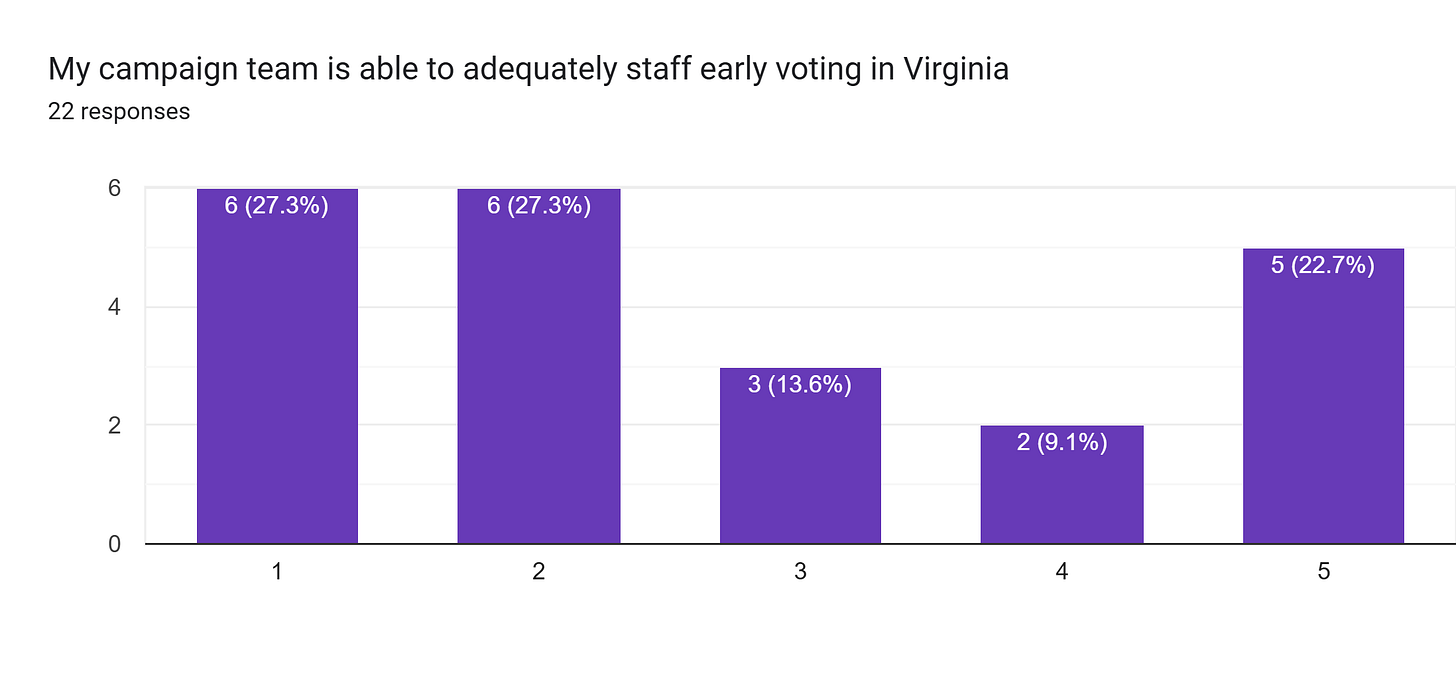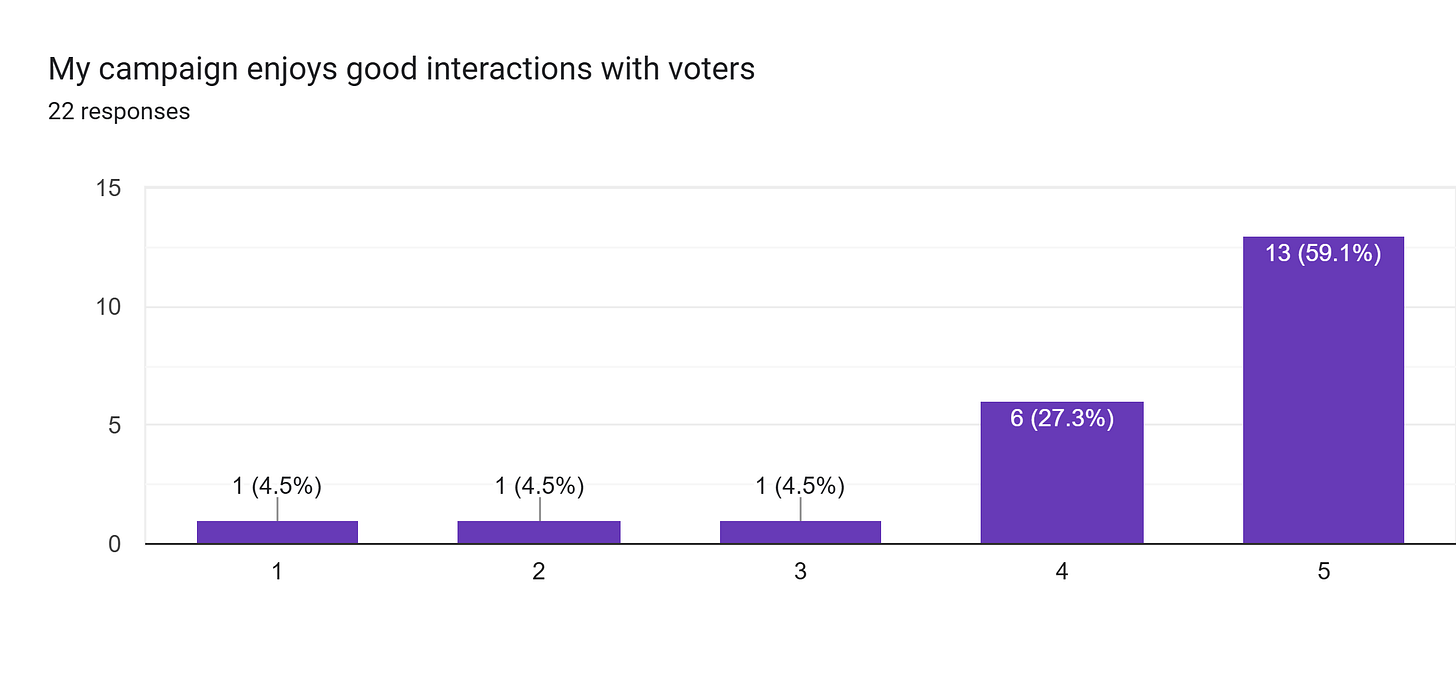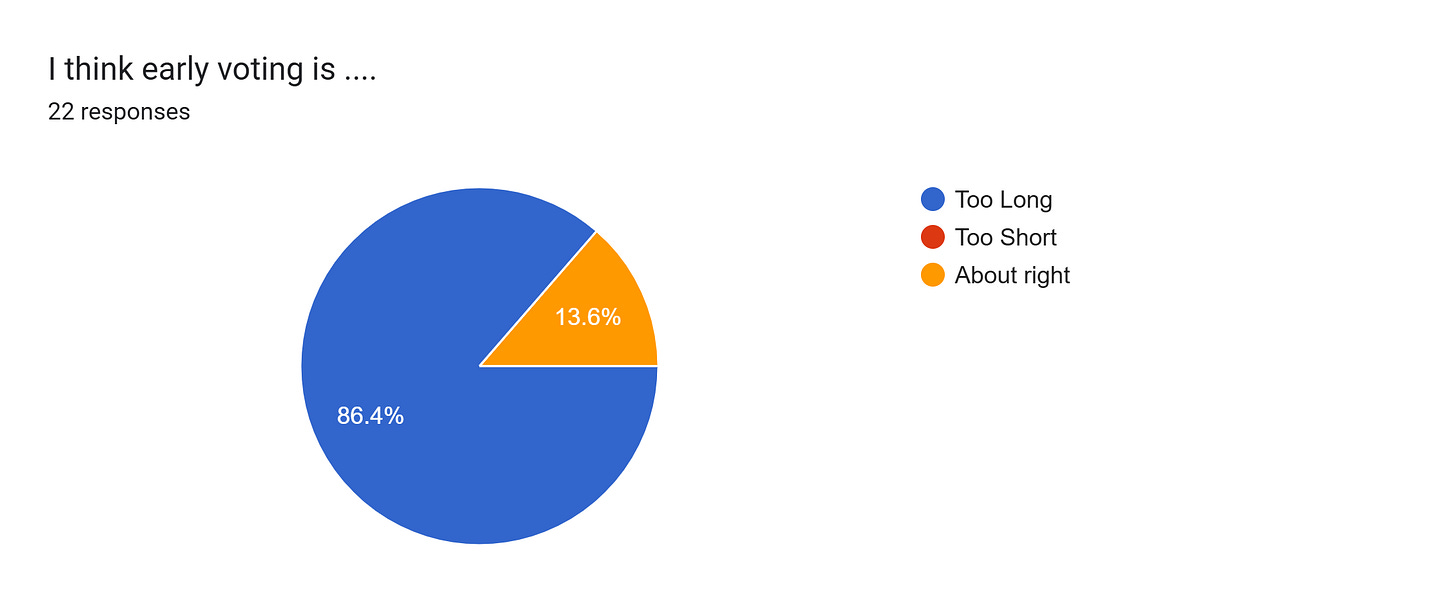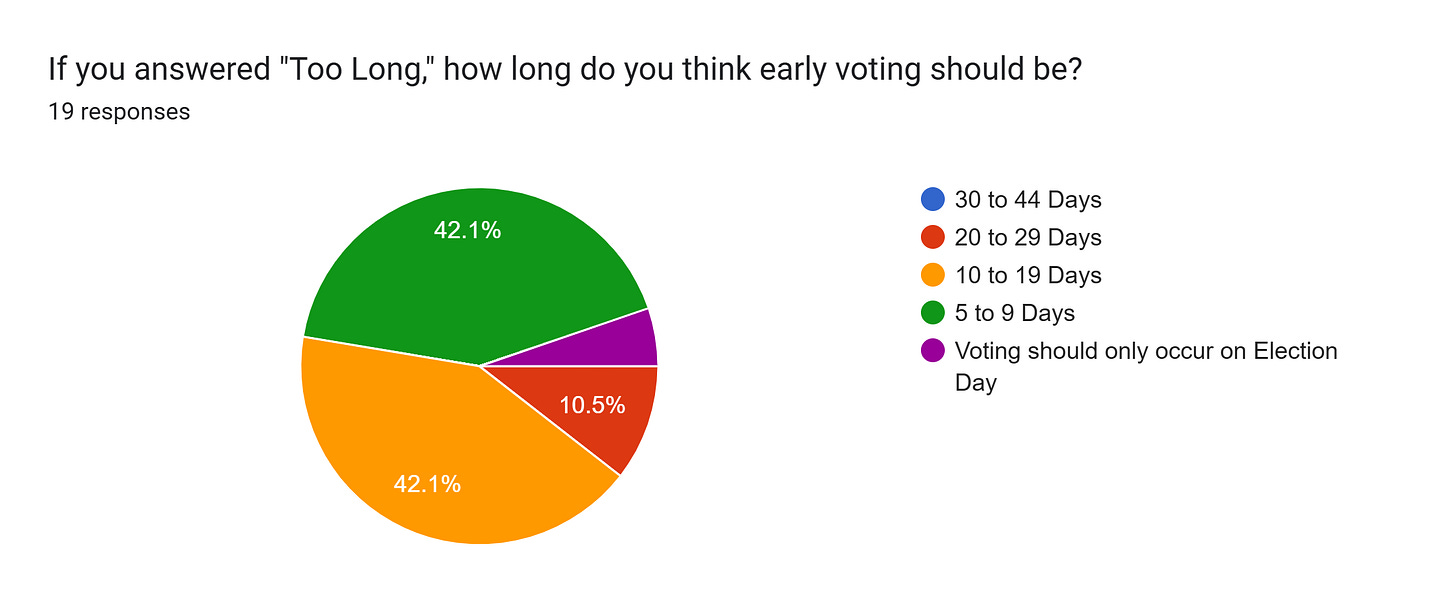FROM THE EDITOR: Early Voting from the Candidates' Perspective
While most would agree that early voting is a good idea, the candidates who have to navigate early voting have some thoughts about what would make it better and more effective for voters.
By Martin Davis
EDITOR-IN-CHIEF
Email Martin

Between the parking lot and doors that lead to the room for early voting in Spotsylvania County runs a picturesque walkway. For 45 days during election season, however, that walkway becomes a gauntlet as voters must pass a line of candidates running for public office.
The day I was there the candidates were respectful, not pushy, and generally understood that when people lowered their heads and made a B-line for the door they didn’t want a sample ballot or to talk.
But early voting doesn’t always go so smoothly. Since early voting began in September, I’ve received an average of four phone calls or text messages or emails each week complaining about poor behavior at early voting sites across the region.
The calls come from voters, from candidates, and from party leaders. Sometimes videos are attached. And while the episodes rarely rise to the level of deserving a news story, it is clear that early voting sites can be stressful places.
At the center of this are the candidates themselves. What do they make of having to run in a state with one of the longest voting periods in the United States?
To find out, the Advance emailed an online interview with 7 questions to local candidates asking their feelings about early voting. To ensure that candidates could answer honestly, the Advance agreed to not identify those who chose to respond. A total of 22 responses were received.
Staffing Early Voting
How difficult is it to staff early voting? On a scale of 1 to 5 (1 = Never, 5 = Always), candidates were asked to respond to the following statement: “My campaign team is able to adequately staff early voting in Virginia.”
Just five of 22 respondents said that they were always able to staff early voting. Fully 54% of candidates selected either “1” or “2”, suggesting that most struggle to ever have people working the polls as voters come by.
Among those who struggled to staff early voting, there is an expressed concern that they’re disadvantaged by not being able to show up.
“It gives local candidates much less time to interact with voters to earn their support before the voting period starts,” one candidate wrote. “It also gives voters the perception that candidates unable to be at early voting everyday don’t care as much. As a result it gives a significant advantage to political parties and independent candidates that don’t have to work during the day.”
Another noted that in local races where party endorsements don’t appear, not being able to staff early voting means they miss an important opportunity to connect with voters. “Many voters are less informed about local races and having that information available to voters before they head into the polls is important.”
Those who report being able to staff early voting frequently feel that being there certainly helps in connecting with voters. “Once you spend so much time with people, you connect with them on a personal level, even political opponents.”
Voter Relations
Do candidates get along well with voters at the polls? On a scale of 1 to 5 (1 = Never, 5 = Always), candidates were asked to respond to the following statement: “My campaign enjoys good interactions with voters.”
The vast majority of candidates reported having positive interactions with votes and talked about how much they enjoyed meeting with them.
The main complaints seemed to be not with voters, but with entities known to be disruptive. “Quite frankly the familiar group that shows up and causes issues for candidates and voters every election season. They walk the line so there isn’t much the registrar or sheriffs can do but it creates an uncomfortable environment for the voters.”
Most candidates reported not only the voters, but their fellow candidates. “Very good working relationships have been formed regardless of party affiliation,” wrote one candidate.”
Length of Early Voting
Candidates were asked if they thought early voting was too long, too short, or about right. A clear majority felt the period was far too long.
While they mostly agreed that early voting is too long, there’s little agreement on just how long early voting should be.
A plurality of candidates felt that a five to nine day early voting period would be ideal. Almost as many felt that 10 to 19 days was the better range. A few opted for 20 to 29 days.
For some candidates, it’s not just the number of days, but the hours that early voting occurs. “Early voting,” one candidate said, “needs to accommodate before and after the workday. 2 weeks 7am-7pm with Saturdays (9-5) should be ample opportunity to allow everyone a chance to vote.”
Another candidate agreed. “If we had a shorter time period but longer days it may work better for those with a regular work schedule who can’t make it 8:30-4:30.”
Misinformation
Candidates were given two different opportunities to deliver thoughts on early voting. Overwhelmingly, while candidates wished the period was shorter, they overwhelmingly expressed joy in meeting regular voters.
That joy, however, was tempered by the amount of misinformation they encounter.
One expressed frustration at having to listen to “candidates and party volunteers deliver false information to voters.”
It was a theme repeated by several candidates. “To see people who normally get along talk poorly about each other in the name of politics,” said one candidate, is disappointing. It’s a sentiment shared by several who responded.
And a few talked about the problems it creates for voters. Said one, “The stress some of the voters feel walking through a busy parking lot with several campaign/party volunteers approaching them at the same time. It is overwhelming.”
Takeaways
The candidates’ responses reveal some challenges that the state should take a closer look at.
Are full-time employees disadvantaged because they can’t be at the polls during early voting? A number of candidates believe it is a handicap. A study that looked at whether local candidates who daily appear at polling stations throughout the early voting period have more success in elections would be worth pursuing.
Staffing early voting is a problem for every candidate. For those who can’t be there or garner enough volunteers to be there, and for those who are there but struggle with the long hours of standing.
The hours that early voting occurs may be as significant an issue for candidates as the number of days that early voting occupies. Several candidates suggested evening hours as a way to solve two problems — allowing candidates who can’t be at early voting because of work to get face-time with voters; give voters who work full-time more opportunities to vote before election day.
While most candidates felt that relationships among candidates was generally positive, enough expressed concerned about arguments and tensions between one another that localities should look at ways to mitigate some of these issues. Most importantly for the voters, who do pick up on the tensions.
This article was updated at 4:33 pm on October 27, 2025, to clear up confusing language about poll workers in the “Misinformation” section.
Local Obituaries
To view local obituaries or to send a note to family and loved ones, please visit the link that follows.
Support Award-winning, Locally Focused Journalism
The FXBG Advance cuts through the talking points to deliver both incisive and informative news about the issues, people, and organizations that daily affect your life. And we do it in a multi-partisan format that has no equal in this region. Over the past year, our reporting was:
First to break the story of Stafford Board of Supervisors dismissing a citizen library board member for “misconduct,” without informing the citizen or explaining what the person allegedly did wrong.
First to explain falling water levels in the Rappahannock Canal.
First to detail controversial traffic numbers submitted by Stafford staff on the Buc-ee’s project
Our media group also offers the most-extensive election coverage in the region and regular columnists like:
And our newsroom is led by the most-experienced and most-awarded journalists in the region — Adele Uphaus (Managing Editor and multiple VPA award-winner) and Martin Davis (Editor-in-Chief, 2022 Opinion Writer of the Year in Virginia and more than 25 years reporting from around the country and the world).
For just $8 a month, you can help support top-flight journalism that puts people over policies.
Your contributions 100% support our journalists.
Help us as we continue to grow!
This article is published under Creative Commons license CC BY-NC-ND. It can be distributed for noncommercial purposes and must include the following: “Published with permission by FXBG Advance.”

















The factual parts seem okay. Yeah, probably wouldn't hurt to reduce the length of early voting - and certainly expanding the hours and days to accommodate those who don't work standard hours is worthwhile.
But once again, it is the conclusions that fall flat. Particularly the one where it is a given that it is everyone's responsibility to "mitigate" arguments and tensions.
Why is that, exactly?
That rings about as hollow as Republicans current claims that we need to purge lesson plans, museums, really - the whole country - of anything which they do not approve.
I reject that premise utterly and passionately. If that rejection create "arguments and tension" - too damn bad.
I don't see it as wrong to be committed to things like the sanctity of life, rule of law, the Constitution, Bill of Rights, peer reviewed science, sound financial planning, and academic and press freedom.
Or to reject blatant corruption, partial justice, malicious prosecutions, suppression of knowledge or art, torture of children, open and casual killings by the state, secret police, casual war for profit, or the awarding or withholding of public monies based upon the arbitrary whims of one man.
I would reject living under such a tyrannical government even if it were made up of people whom I admired.
Why on Earth would I not argue against the one as unfit as currently rules us due to Republicans acquiescence? A better question is why are you not arguing against it?
Honestly, it is those such as yourself who continue to pretend that it is that people who make you or them uncomfortable by mentioning these things; rather than the fact that the issues are occurring - appear to me to be as much or more of a problem as them doing those things.
I want injustice to be uncomfortable. For those causing it to feel tension. And the ballot box is one of the few legal, non-violent ways we have to do so. As flawed as it is. That is exactly the place where those tensions should be addressed.
I used to believe that was a core tenet of a free press. When did it quit? And why?
I suspect that those who look back 200 years from now, should there still be a people who are allowed to do so - it will not be the people such as me who created "tension" or argued when these things happened that gives them pause.
Rather, it will be why so many people did not.
Is comity really all that matters?
And I expect, when they do reach a conclusion - the answer will be the same one given by Tom Joad in the Grapes of Wrath when the Preacher is urging him to come out on strike.
"I dunno, Pa likes his hamburger..."
As long as you got yours, it's easy to pretend it's all academic, right?
Still, as long as there's no tension.....
SMH.